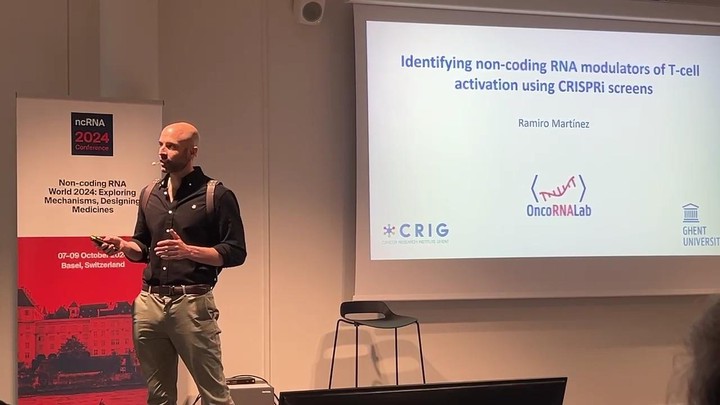Identifying non-coding RNA modulators of T-cell activation using CRISPRi screens

Abstract
The adaptive and innate immune systems collaborate to detect and eliminate tumor cells, with T lymphocytes playing a crucial role. Cancer cells develop mechanisms weakening T-cell-mediated anti-tumoral responses due to genetic heterogeneity. Checkpoint inhibition therapies (ICTs), including immune checkpoint inhibitors (ICIs) against PD-1/PD-L1 and CTLA-4, yield sustained anti-tumor responses in diverse cancer subtypes. Despite achievements, ICT efficacy is limited. For metastatic melanoma, 40–60% of patients lack a therapeutic response, and responders experience tumor relapse within two years. Strategies enhancing ICTs and understanding immune evasion mechanisms are crucial. Emerging evidence highlights a prominent involvement of long non-coding RNAs (lncRNAs) in cancer development and progression. Moreover, some lncRNAs have been shown to actively regulate T-cell activation or evasion. Our research focuses on identifying immuno-modulating lncRNAs and compounds in T-cells and tumor cells. We employ an antigen-specific Jurkat-derived cell line (2D3) expressing GFP linked to an NFAT promoter and a MART-1-specific TCR, detecting immune cell activation via MART-1 TCR-antigen interactions. 2D3 was also transduced with dCas9-KRAB-MECP2 for CRISPRi purposes on lncRNAs. To ascertain immuno-modulating lncRNAs in T-cells, we designed a custom sgRNA library targeting highly expressed lncRNAs selected via RNA sequencing on 2D3 and donor samples. Pooled screening infecting 2D3s with the sgRNA library and co-culturing with the melanoma cell line MALME-3M was performed, and promising hits are currently being validated. Relevant lncRNAs on the tumor side were elucidated using a novel high-throughput lentiviral-based screening platform developed during this project. Silencing target lncRNAs in melanoma cell lines through dCas-KRAB-MeCP2 prior co-culture enabled hit identification, and we are also in the validation stage of HITs. Finally, we integrated a screening arm for potential compounds modulating T-cell–tumor cell interactions. A co-culture setup in 384-well plates screens a library of 3000 compounds on SK-MEL-5 melanoma cells known for complex immune evasion. Our findings will hopefully provide valuable insights into cancer immune resistance mechanisms and potential therapeutic targets, including lncRNAs and compounds.